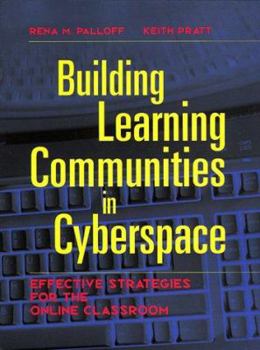Building Learning Communities in Cyberspace: Effective Strategies for the Online Classroom
Select Format
Select Condition 
Book Overview
1999 Winner of the Philip E. Frandson Award for Literature in Continuing Higher Education, from the University Continuing Education Association "A must read for anyone involved in or considering involvement in online, networked learning." -- Donald J. MacIntyre, president, The Fielding Institute "A thorough overview of the online course process, including course selection, design, and evaluation, and many of the technical issues that affect the entire...
Format:Paperback
Language:English
ISBN:0787944602
ISBN13:9780787944605
Release Date:March 1999
Publisher:Jossey-Bass
Length:240 Pages
Weight:1.00 lbs.
Dimensions:0.6" x 6.9" x 9.3"
Customer Reviews
5 ratings
Pedagogically sound online learning
Published by Thriftbooks.com User , 24 years ago
If you are looking for a great book to engage you, a bible of sorts for the online classroom, and a well-written, pedagogically sound reading to enable you to design an online course, look no further. If you need something concrete to show your administration "best practice" applications of online learning, you've found it here. For anyone contemplating distance learning, or even simply supplementing a traditional course with online activities, this book is a must. Clearly written with a focus on the pedagogical rather than the technological aspects of online learning, this teaching guide offers specific advice for any number of situations and practical applications of online activities applicable to any course. The focus is constructivist in nature - "learner centered" - and there are numerous suggestions for incorporating collaborative learning in distance education, hence the title choice. The authors even define dialogue and discussion, stressing why both are necessities in collaborative learning environments. Dialogue focuses more on learners being open to "restructuring their mental models" while discussion seems more like a game of ping pong, a "volley of views between people." The authors stress how both are necessary for collaborative learning, and there are many examples showing how online learning can be used to focus on issues of Bloom's Taxonomy, something often missing from lecture-based courses. This is the kind of book you'll read and reread often. The authors share their extensive background in online education, both as educators and students, in the beginning of the book. Their extensive research prior to their writing is clearly evident from the references included throughout the text and the examples from various courses besides their own. They set the tone and purpose by providing a brief glimpse of the origins of online learning in their own lives. Having been students as well as educators, these two draw on considerable experiences to establish their authority in this field. Throughout the book, Drs. Palloff and Pratt bring in specific examples from their own classes to illustrate what has worked and how they structured classes, as well as student responses/reactions. There are specific examples of syllabi which readers can adopt in part or whole. Graphics illustrate how the online courses look, and the brief mention of course management applications clearly shows the authors are less concerned with the technical applications than with the learning resulting from the course. Online learning, as noted by Drs. Palloff & Pratt, is about learning, not technology. This is unquestionably written for educators.If anyone believes online learning creates dysfunctional communication or eliminates meaningful interactions between instructors and students, these authors show how easily discussion groups can be created, pointing out that online learning enhances rather than deters fr
The Best Primer I've Read So Far
Published by Thriftbooks.com User , 24 years ago
Palloff and Pratt do an exemplary job at presenting the theoretical as well as practical aspects of building an online learning community. Using the constructivist approach as a foundation, the authors discuss step-by-step how to create an online environment that supports collaboration, dialogue, reflection, and transformational learning. The examples of student and facilitator coversations as well as sample syllibi helped me to visualize the concepts that were presented. Thanks to this book, I have a much better understanding of where to begin. I recommend this book for anyone involved in online learning, especially facilitators, instructional designers, administrators, and learners!
New Educational Culture via OnLine Classrooms
Published by Thriftbooks.com User , 24 years ago
This book is essential reading for any institution that has created (or is considering creating) on-line training or educational facilities. The information in this book will assist in avoiding typical obstacles, enhance the educational experience, and create a solid community in the on-line environment. This book summed up so much of what we have experienced that I am ordering more copies to circulate to all of our on-line instructors.
A 'Must Have' for an Online Educator
Published by Thriftbooks.com User , 25 years ago
Palloff and Pratt present the theoretical foundation of interactive distance learning and combine it with practical guidelines to address the challenges of forming an online community. Topics include: Time and Group Size, Managing the Technology, Building an Effective Course Syllabus, Promoting Collaborative Learning, and Evaluation/Assessment.I believe it is an excellent resource for those new to online instruction as well as for those, like myself, who have already suffered the slings and arrows of developing and delivering an online, community-centered course.
The Essence of Class!
Published by Thriftbooks.com User , 25 years ago
Finally, a book that captures the essence of a class online. It's not gorgeous web pages or streaming audio or video. It's the human communication, interaction and the building of learning communities. And that's exciting.For those, who want to know how this all works, here's the book that finally explains, demos with real student interactions, and celebrates learning.As an online teacher since 1992(BW-before the web), I appreciate this text which shows how exciting an online classroom can be. It also serves to show teachers where the "teach" is in web-based courses.





